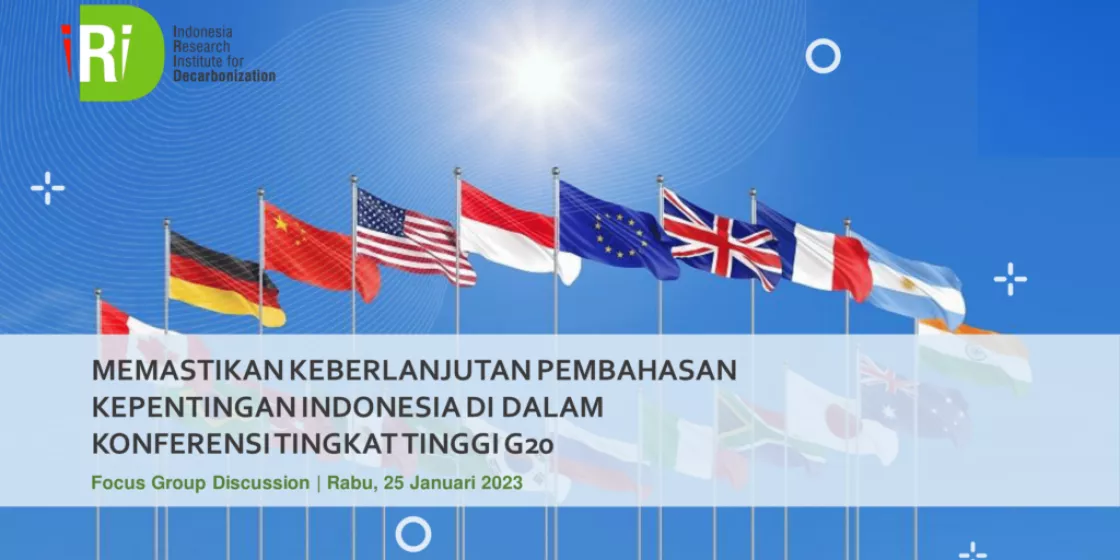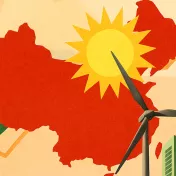In 2022, Indonesia had the opportunity to host the annual G20 Summit, where the energy transition played a major role. The summit produced two key documents on energy, namely the Bali Roadmap and the Bali Compact. Both documents are expected to serve as a reference for G20 countries to achieve a just energy transition, even after Indonesia’s G20 presidency.
Although India now officially holds the 2023 G20 presidency, this does not diminish Indonesia's role in the G20 leadership as it is based on a troika system. This means that the G20 leadership is in fact held by three countries, namely, the host country, the future host country, and the previous host country. Interestingly, the G20 Troika in 2023 is being held by developing countries, namely India (host country), Brazil (future host country), and Indonesia (previous host country). This will allow Indonesia to monitor whether the topics and processes that were important during its own Presidency are continued and fleshed out so that all parties can benefit from them.
The Indonesia Research Institute for Decarbonization (IRID) and Germanwatch acknowledge that this is important in order to avoid that dialogues at the G20 Summit start from scratch. For this reason, a focus group discussion took place in Jakarta on 25 January 2023. The discussion was limited to invitees.
IRID and Germanwatch recognise the significance of the G20 engagement groups as their perspectives and inputs contribute to the decisions or agreements that emerge from the G20 meeting. Therefore, the speakers present included a number of G20 representatives and members of engagement groups such as T20 and B20: Billy Wibisono, Directorate of Economic Development and Environment (PELH), Ministry of Foreign Affairs; Wukir Amintari Rukmi, Head of Sub-directorate of Climate Change Negotiation Facilitation; Yose Rizal Damuri, Executive Director of Centre for Strategic and International Studies (CSIS) and Executive Co-Chairs of T20 Indonesia; and Ary Kurniawan, Vice President Planning & Commercial Development, PT Pertamina (Persero); and Policy Advisors Task Force Energy, Sustainability and Climate B20 Indonesia.
Key themes of Indonesia’s G20 Presidency
‘Recover Together, Recover Stronger’ was the theme of the 2022 G20 Summit in Indonesia. It consists of three main pillars: global health architecture, digital transformation, and energy transition. These pillars represent concrete, tangible, and impactful areas that are expected to become a sustainable and inclusive agenda for everyone around the world, and in particular for the member countries of the G20.
India’s theme in the 2023 G20 is ‘Vasudhaiva Kutumbakam’ or ‘One Earth, One Family, One Future’. It comprises six key areas:
- Accelerated inclusive and resilient growth
- Accelerating SDG progress
- Green development
- Climate and LiFE (Lifestyle for Environment)
- Technological transformation and digital public infrastructure
- Multilateral institutions for the 21st century and 3Fs (Food, Fuels, Fertilisers)
- Women-led development
Energy will fall under the Climate and LiFE key area. Indonesia will need to pay particular attention to how India will address and follow up on the topics from the G20 Summit in Bali last year.
T20 and B20 follow-up on G20 issues
The G20 Presidency recognises several non-governmental groups as ‘engagement groups’ that can contribute their perspectives on topics discussed in the G20 negotiations. Think 20 (T20), a group of research organisations, for example, is a global think tank working on current affairs related to the G20. Another engagement group is the Business 20 (B20), a group of business entities with an interest in G20 issues. The B20 represents the private sector and promotes robust, equitable, and sustainable economic development by engaging companies from different parts of the world. There are three reference points that the B20 uses when developing policies, namely securing energy accessibility, clean energy technologies, and clean energy finance and investment.
One of the concerns the engagement groups raised during the discussion was their role during India's G20 Presidency in 2023. Another was how to ensure that key issues that emerged during Indonesia's G20 Presidency—so-called legacy issues—would continue during the Indian Presidency. Therefore, it is crucial for Indonesia to remind the Indian Presidency of the persistent challenges and the actions they require.
As global issues evolve, so do the issues that individual countries have at stake. This was a major challenge during the previous G20 as each country wanted to include discussions of its own national agenda, which ultimately led to less effective discussions. How to provide and manage global public goods together will therefore be the most challenging discussion at the G20 level.
Next steps for Indonesia in the G20
The question of the sustainability of the G20 is inseparable from the effectiveness of the engagement groups and their relationship with the G20 Presidency. The engagement groups must be able to engage the G20 through a series of closed discussions in order to contribute to the decision-making process. A closer relationship and involvement of the engagement groups with the G20 could be the key to their effectiveness.
It is also important to note that the position and status of engagement groups is not permanent. They can be removed or added depending on the position and interests of the Presidency. For example, the Indian Presidency added a new engagement group, Startup20. Therefore, it is important to ensure the continuity of each engagement group and to acknowledge the changing dynamics between them.
The focus group discussion also identified technology transfer and knowledge sharing as a major point of discussion for the G20. This is needed to improve the capacity of countries to apply certain technologies and contribute to the reduction of greenhouse gas emissions. Moreover, it could contribute to mitigating the effects of climate change.
------------------------------------------------------------
This blog post was first published in Indonesian on 10 February 2023 by our partner organisation Indonesia Research Institute for Decarbonization (IRID). To access the original article, please follow this link.






